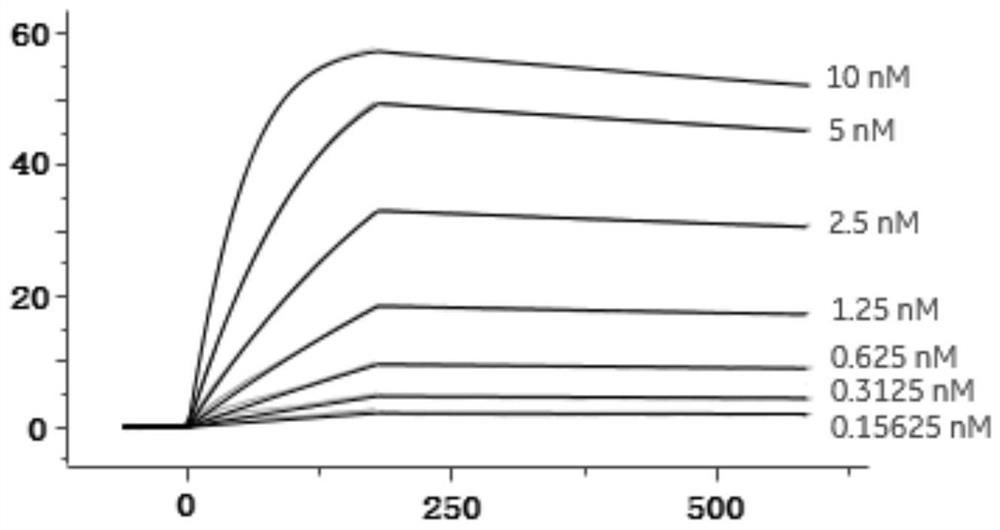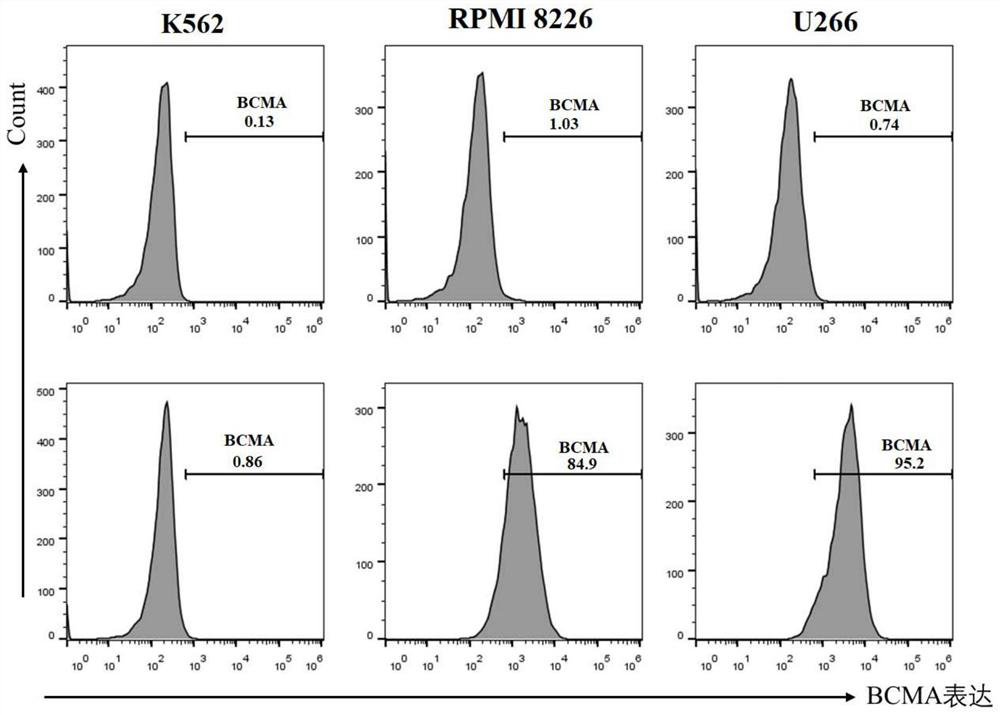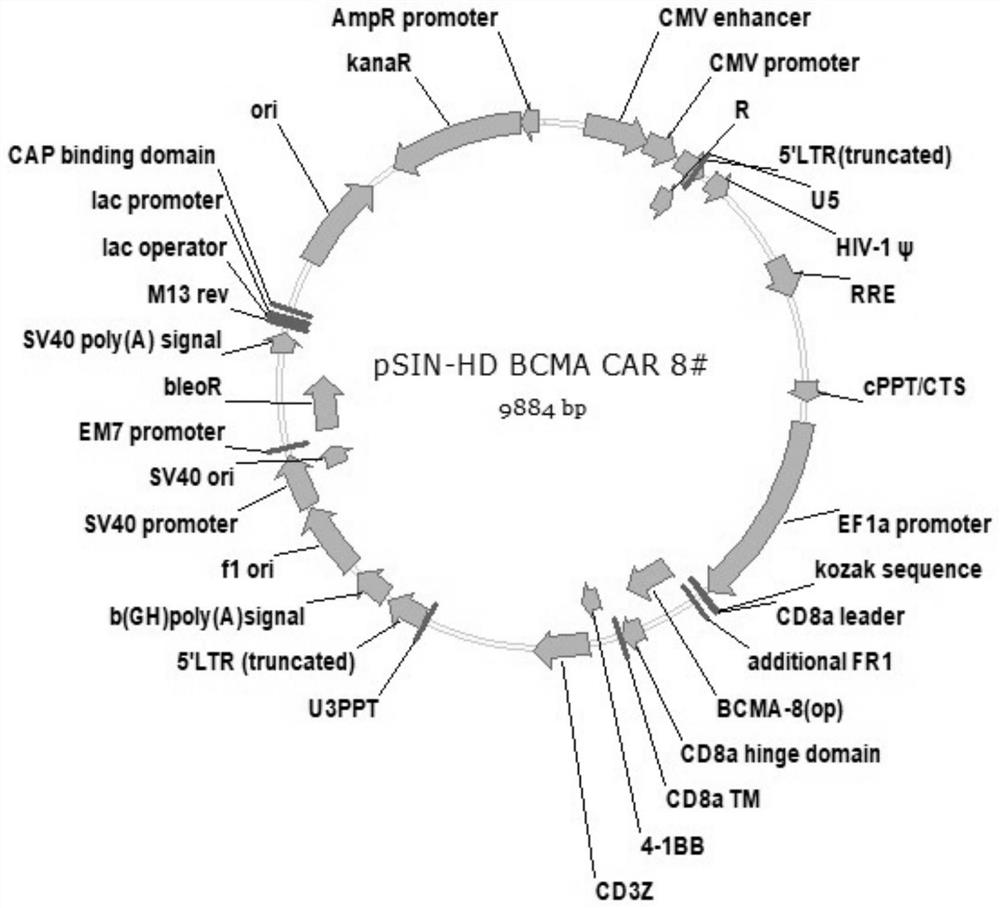A kind of nanobody against B cell maturation antigen and its application
A nanobody and B cell technology, applied in the field of biomedicine, can solve the problem of not achieving the ideal effect, and achieve the effect of improving the killing ability
- Summary
- Abstract
- Description
- Claims
- Application Information
AI Technical Summary
Problems solved by technology
Method used
Image
Examples
Embodiment 1
[0064] This example is used for the construction and panning of a phage nanobody library, and ELISA is used for preliminary screening. Specific steps are as follows:
[0065] (1) Construction of phage nanobody library
[0066] Bactrian camels were immunized with BCMA-Fc expressing the extracellular region, and after ELISA was used to verify the titer, 200 mL of peripheral blood was drawn; lymphocytes were sorted to obtain peripheral blood mononuclear lymphocyte precipitates, and RNA was extracted; III reverse transcriptase uses RNA as a template to synthesize the first-strand cDNA, and then uses nested PCR to amplify the VHH gene; insert the VHH gene into the pMECS phage display vector, and electrotransform TG1 competent cells, and take an appropriate amount of bacterial liquid for library identification , all the remaining cultures were evenly spread on the LB / AMPGLU plate. After the bacteria grew out, the bacterial lawn was collected, and 1 / 3 volume of 50% glycerol was add...
Embodiment 2
[0080] In this example, the candidate clones were screened by flow cytometry (Fluorescence activated CellSorting, FACS).
[0081] Cells were cultured according to standard cell culture protocols, and cells were digested with trypsin to prepare BCMA-positive and negative cell suspensions; centrifuged at 300 g for 5 min to remove the culture medium, and resuspended cells in Flow Buffer to 2×10 6 cells / mL; add 2 x 10 to each well in a V-bottom 96-well plate 5Cells were centrifuged at 300g for 5min, the supernatant was removed, the crude VHH antibody extract was added to resuspend the cells, and the cells were incubated at 4°C for 1h;
[0082] After centrifugation at 300 g for 5 min, remove the supernatant, resuspend the cells in Flow Buffer, dilute APCanti-his antibody to 2 μg / mL in Flow Buffer, resuspend cells in 100 μL per well, and incubate at 4°C for 1 h; wash the cells with Flow Buffer for 3 times and then use 200 μL Flow Buffer Cells were resuspended and analyzed by flow c...
Embodiment 3
[0084] In this example, the VHH-mIgG2a Fc nanobody was expressed and purified, and the antibody affinity was determined. In order to further identify the antibodies obtained by screening, the antibodies need to be expressed by mammalian cells. Therefore, a plasmid vector expressing VHH with a mouse Fc tag was constructed first, which is denoted as C-4 pCP.Stuffer-mCg2a-FC. The specific steps are as follows:
[0085] 1. Amplify BCMA VHH B8 by PCR with primers:
[0086] HDB8-F (SEQ ID NO. 10):
[0087] CGCGATTCTTAAGGGTGTCCAGTGCGAGGTTGCAGCTGGTGGA;
[0088] HD-B8-R (SEQ ID NO. 11):
[0089] GCATGGAGGACAGGGCTTGATTGTGGGGCTAGACACTGTCACCTG
[0090] The reaction system is shown in Table 2, and the amplification procedure is shown in Table 3 below:
[0091] Table 2
[0092]
[0093] table 3
[0094]
[0095] 2. The digestion system is shown in Table 4. The digestion temperature is 37°C and the time is 6h. The PCR purification kit was used for purification, and the recover...
PUM
 Login to View More
Login to View More Abstract
Description
Claims
Application Information
 Login to View More
Login to View More - R&D
- Intellectual Property
- Life Sciences
- Materials
- Tech Scout
- Unparalleled Data Quality
- Higher Quality Content
- 60% Fewer Hallucinations
Browse by: Latest US Patents, China's latest patents, Technical Efficacy Thesaurus, Application Domain, Technology Topic, Popular Technical Reports.
© 2025 PatSnap. All rights reserved.Legal|Privacy policy|Modern Slavery Act Transparency Statement|Sitemap|About US| Contact US: help@patsnap.com



